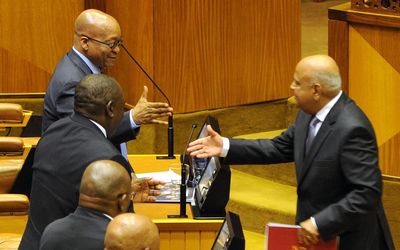I DON’T know whether to be more or less nervous about the country after Wednesday’s budget.
On one hand, Finance Minister Pravin Gordhan made it all look so easy. He didn’t raise the income tax I have to pay and he seems to have found enough other tax revenue, and sufficient spending cuts, to dramatically speed up what economists like to call "fiscal consolidation" — a fancy term for lowering the budget deficit as measured against the gross domestic product (GDP).
Where his predecessor, Nhlanhla Nene, was going to wrestle down spending only slowly to bring the deficit to 3% of GDP by 2018-19, Gordhan outlined a plan to get it down to 2.4% in the same time frame. It is a big number and a big deal.
A 3% deficit is what you’re supposed to have, for instance, before you’re admitted to the European Union (EU). It is because the Greeks lied about their deficit before joining the EU that creditors are now so suspicious of them and lend only on the most grotesque terms.
But then you read the Budget Review, a document of blinding transparency (and a lasting testament to the honest endeavour of the Treasury) and you worry.
It isn’t, as the review reveals, that our total national debt (excluding local government and state-owned companies) now stands at R2,055.7bn (R2-trillion) or that it will rise to R2,606.9bn in the next two years.
It isn’t because, as the review reveals, that SA Airways (SAA) actually used (as in spent) R6bn in government guarantees in just this financial year.
It isn’t because economic growth in SA is going to continue sliding this year, while other developing economies will grow.
And it isn’t because the rating agencies and markets didn’t fall to their knees in awe at the budget.
It is because the African National Congress (ANC), and much of the government, especially President Jacob Zuma, will not have even remotely appreciated what Gordhan was able to do for them. Instead, they resent him and the Treasury.
Two days before the budget, Zuma told journalists that he still believed Des van Rooyen, whom he briefly appointed after firing Nene, was the best qualified man for the job, a real slap in the face for Gordhan at the worst possible time.
Fortunately, perhaps, the review also makes it possible to calculate exactly what that catastrophic decision is costing us.
To borrow money to fund welfare, infrastructure, and (increasingly) public sector salaries, the government issues bonds, which it has to pay back.
Normally, you would do that by growing your economy and by collecting the extra taxes that flow from the growth, as companies make more profit and pay more salaries to be taxed.
The yield, or return, on a South African government 10-year bond spiked alarmingly the moment Zuma fired Nene.
It isn’t a capitalist plot, as some idiots suggested at the time. It is just a fact of the debt market. That yield spike settled back a bit after Gordhan was appointed (again), but at a much higher level, and, again according to the review, the increase (to SA) in paying off that debt has risen by R15.3bn over the next two years.
That then is the official calculation of what Zuma’s decision is costing the government (let alone the rest of us with higher interest rates and inflation).
Excluding weekends and 13 public holidays, I get to 248 working days in SA a year. Two years makes it 496 days.
Divide R15.3bn by 496 days and you arrive at R30.8m per day to pay for what Zuma did on December 9 last year.
That’s now. It could get worse if the currency and growth slides and the yield on our bonds rises.
It isn’t the end of the world. Some people thrive on high-yield bonds even beyond the point where the bonds are downgraded to junk status by the international rating agencies.
You can still raise money, but it costs you more and more until you have to go to the International Monetary Fund for help in paying your debts, and by then it has cost you your sovereignty.
The scariest part of this is that we now know, partly thanks to a wonderful article by the outgoing editor of Business Day, Songezo Zibi, in this newspaper’s budget supplement on Thursday, that Nene was fired just hours after a December 9 Cabinet meeting had discussed the outlines of the budget he had begun to plan to present himself on Wednesday.
Ministers grumbled. They didn’t like it. They weren’t being allocated enough money, expenses were being squeezed, and Zuma was irritated there wasn’t enough money to press ahead with his grand and absurdly expensive nuclear power ambitions. Nor was Nene budging on his refusal to allow SAA to get into more debt.
So Zuma, oblivious to the dangers that people such as Nene and Gordhan keep from the door, fired him. Van Rooyen’s only public statement on the job he was given was that he would make the Treasury "more accessible". Go figure.
I thought Gordhan did a wonderful job on Wednesday. Yes, we may still be downgraded to junk status by the rating agencies. The markets wanted not only consolidation, but structural reform — less stringent labour laws, more privatisation — but it is ridiculous to have expected that of him.
Perhaps a downgrade would do us some good. It would show us what economic hardship really looks like. Unable to imagine bankruptcy or understand the need to manage money carefully, the ANC may actually need to experience what it would feel like to default on pensions or social security grants before the scales fall from its eyes.
Gordhan and the Treasury, meanwhile, face years of hostility from their own colleagues.
In the Budget Review, he promises to literally block payments for unauthorised appointments in government departments. Tenders, the source of all our corruption, will be squeezed through a new Office of the Chief Procurement Officer.
He is setting himself up for nothing but pain, but he is going to do his duty. Hopefully, the debt markets will appreciate the scale of what he promised to do.
His colleagues in the party, the leeches and the cronies on whose backs Zuma has survived, will not thank Gordhan for at least pulling us back from the fiscal cliff, downgraded or not. Instead, they will continue to plot behind his back and do their best to push him over that cliff.
The ANC isn’t going to thank Gordhan for pulling us back from the fiscal cliff. Instead, more likely than not they will try to push him over it

President Jacob Zuma and Deputy President Cyril Ramaphosa shake hands with Finance Minister Pravin Gordhan after his budget speech in Cape Town on Wednesday. Picture: GCIS
I DON’T know whether to be more or less nervous about the country after Wednesday’s budget.
On one hand, Finance Minister Pravin Gordhan made it all look so easy. He didn’t raise the income tax I have to pay and he seems to have found enough other tax revenue, and sufficient spending cuts, to dramatically speed up what economists like to call "fiscal consolidation" — a fancy term for lowering the budget deficit as measured against the gross domestic product (GDP).
Where his predecessor, Nhlanhla Nene, was going to wrestle down spending only slowly to bring the deficit to 3% of GDP by 2018-19, Gordhan outlined a plan to get it down to 2.4% in the same time frame. It is a big number and a big deal.
A 3% deficit is what you’re supposed to have, for instance, before you’re admitted to the European Union (EU). It is because the Greeks lied about their deficit before joining the EU that creditors are now so suspicious of them and lend only on the most grotesque terms.
But then you read the Budget Review, a document of blinding transparency (and a lasting testament to the honest endeavour of the Treasury) and you worry.
It isn’t, as the review reveals, that our total national debt (excluding local government and state-owned companies) now stands at R2,055.7bn (R2-trillion) or that it will rise to R2,606.9bn in the next two years.
It isn’t because, as the review reveals, that SA Airways (SAA) actually used (as in spent) R6bn in government guarantees in just this financial year.
It isn’t because economic growth in SA is going to continue sliding this year, while other developing economies will grow.
And it isn’t because the rating agencies and markets didn’t fall to their knees in awe at the budget.
It is because the African National Congress (ANC), and much of the government, especially President Jacob Zuma, will not have even remotely appreciated what Gordhan was able to do for them. Instead, they resent him and the Treasury.
Two days before the budget, Zuma told journalists that he still believed Des van Rooyen, whom he briefly appointed after firing Nene, was the best qualified man for the job, a real slap in the face for Gordhan at the worst possible time.
Fortunately, perhaps, the review also makes it possible to calculate exactly what that catastrophic decision is costing us.
To borrow money to fund welfare, infrastructure, and (increasingly) public sector salaries, the government issues bonds, which it has to pay back.
Normally, you would do that by growing your economy and by collecting the extra taxes that flow from the growth, as companies make more profit and pay more salaries to be taxed.
The yield, or return, on a South African government 10-year bond spiked alarmingly the moment Zuma fired Nene.
It isn’t a capitalist plot, as some idiots suggested at the time. It is just a fact of the debt market. That yield spike settled back a bit after Gordhan was appointed (again), but at a much higher level, and, again according to the review, the increase (to SA) in paying off that debt has risen by R15.3bn over the next two years.
That then is the official calculation of what Zuma’s decision is costing the government (let alone the rest of us with higher interest rates and inflation).
Excluding weekends and 13 public holidays, I get to 248 working days in SA a year. Two years makes it 496 days.
Divide R15.3bn by 496 days and you arrive at R30.8m per day to pay for what Zuma did on December 9 last year.
That’s now. It could get worse if the currency and growth slides and the yield on our bonds rises.
It isn’t the end of the world. Some people thrive on high-yield bonds even beyond the point where the bonds are downgraded to junk status by the international rating agencies.
You can still raise money, but it costs you more and more until you have to go to the International Monetary Fund for help in paying your debts, and by then it has cost you your sovereignty.
The scariest part of this is that we now know, partly thanks to a wonderful article by the outgoing editor of Business Day, Songezo Zibi, in this newspaper’s budget supplement on Thursday, that Nene was fired just hours after a December 9 Cabinet meeting had discussed the outlines of the budget he had begun to plan to present himself on Wednesday.
Ministers grumbled. They didn’t like it. They weren’t being allocated enough money, expenses were being squeezed, and Zuma was irritated there wasn’t enough money to press ahead with his grand and absurdly expensive nuclear power ambitions. Nor was Nene budging on his refusal to allow SAA to get into more debt.
So Zuma, oblivious to the dangers that people such as Nene and Gordhan keep from the door, fired him. Van Rooyen’s only public statement on the job he was given was that he would make the Treasury "more accessible". Go figure.
I thought Gordhan did a wonderful job on Wednesday. Yes, we may still be downgraded to junk status by the rating agencies. The markets wanted not only consolidation, but structural reform — less stringent labour laws, more privatisation — but it is ridiculous to have expected that of him.
Perhaps a downgrade would do us some good. It would show us what economic hardship really looks like. Unable to imagine bankruptcy or understand the need to manage money carefully, the ANC may actually need to experience what it would feel like to default on pensions or social security grants before the scales fall from its eyes.
Gordhan and the Treasury, meanwhile, face years of hostility from their own colleagues.
In the Budget Review, he promises to literally block payments for unauthorised appointments in government departments. Tenders, the source of all our corruption, will be squeezed through a new Office of the Chief Procurement Officer.
He is setting himself up for nothing but pain, but he is going to do his duty. Hopefully, the debt markets will appreciate the scale of what he promised to do.
His colleagues in the party, the leeches and the cronies on whose backs Zuma has survived, will not thank Gordhan for at least pulling us back from the fiscal cliff, downgraded or not. Instead, they will continue to plot behind his back and do their best to push him over that cliff.
The ANC isn’t going to thank Gordhan for pulling us back from the fiscal cliff. Instead, more likely than not they will try to push him over it






















Change: -1.43%
Change: -1.61%
Change: -1.68%
Change: -1.58%
Change: -1.40%
Data supplied by Profile Data
Change: -0.73%
Change: 0.12%
Change: -1.43%
Change: 0.00%
Change: 0.10%
Data supplied by Profile Data
Change: 0.58%
Change: -0.23%
Change: 0.54%
Change: 0.89%
Change: 0.93%
Data supplied by Profile Data
Change: 0.90%
Change: 0.61%
Change: 0.63%
Change: 0.50%
Change: -0.41%
Data supplied by Profile Data